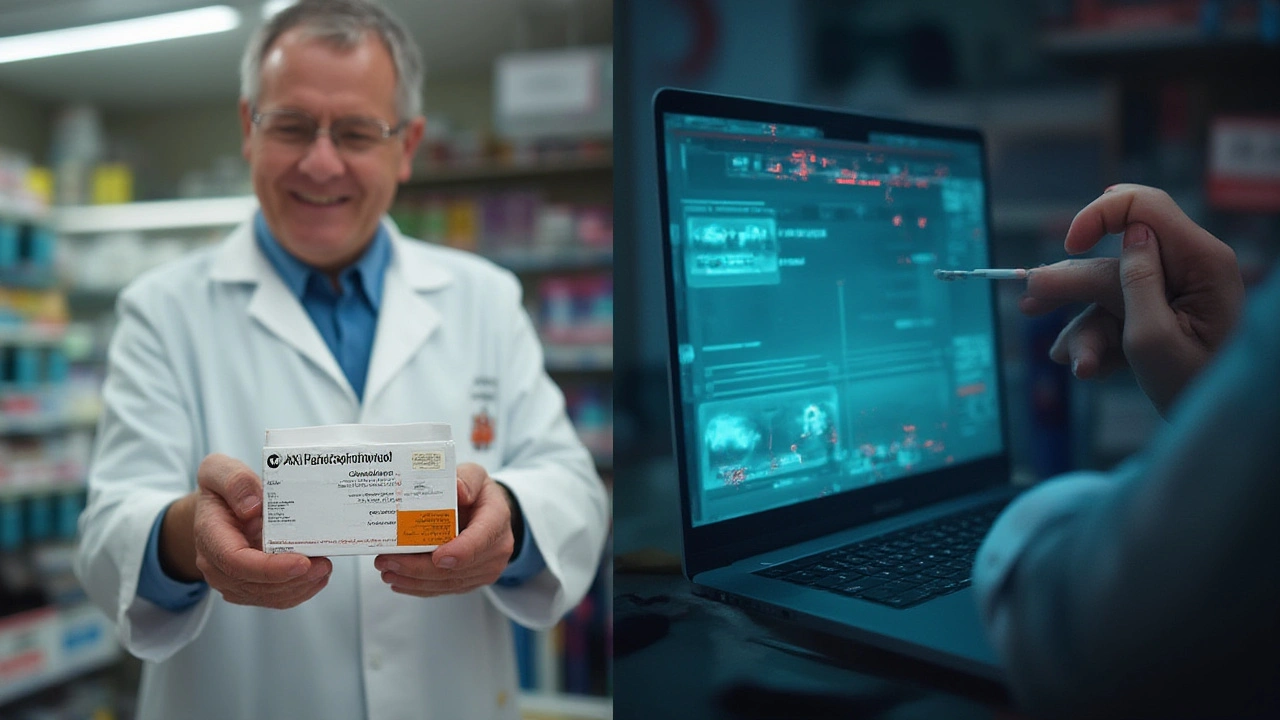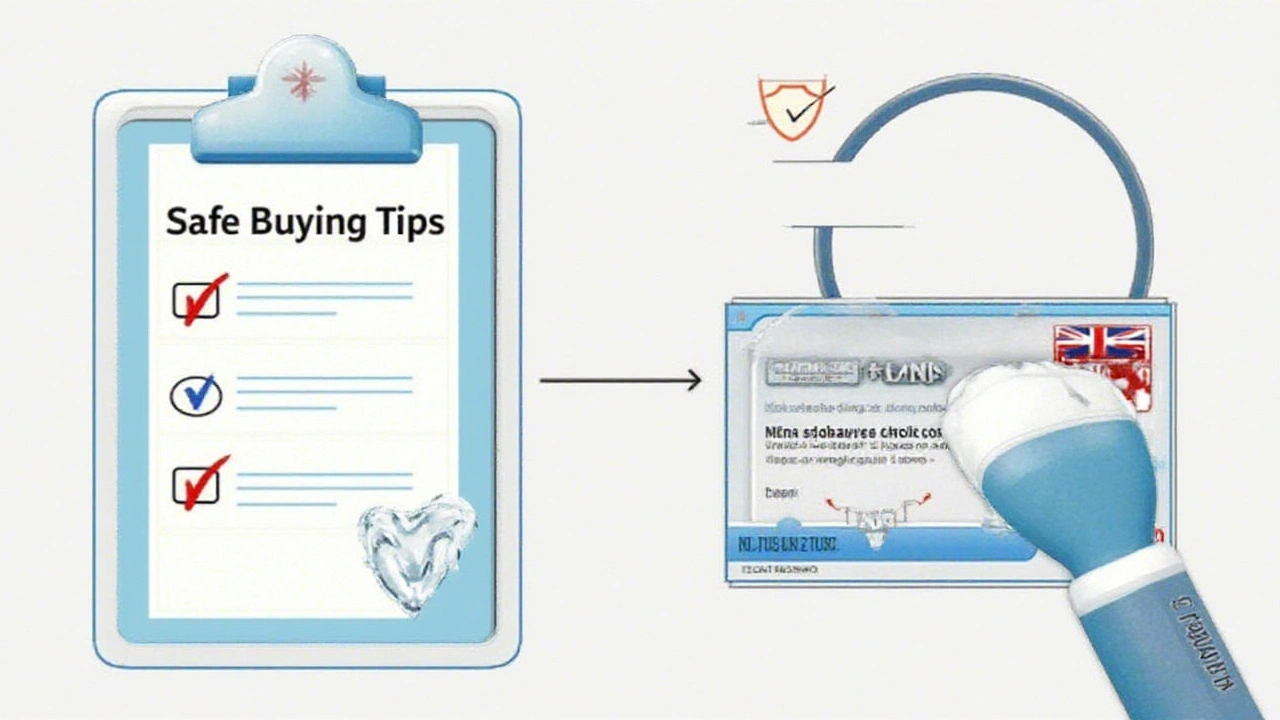Stumbling onto the topic of buying antibiotics like Chloramphenicol online is like opening a door no one tells you about, yet so many people quietly use. It’s not just about skipping lines at your local pharmacy or saving a few bucks. People look for Chloramphenicol for eye infections, rare bacterial issues, and sometimes when old-fashioned options no longer work. But is ordering it online simple? Safe? Even legal? The truth is, it’s a bumpy road. Chloramphenicol isn’t a basic over-the-counter medicine in most places, and shopping for it on the web brings up questions about your health, fake meds, and following the law. Let's shine some light on the topic—giving you clear steps, pitfalls to avoid, and what you really need to know if you want to buy Chloramphenicol online in 2025.
What Is Chloramphenicol, and Why Do People Buy It Online?
If you haven’t heard the name before, Chloramphenicol may sound like something out of a chemistry class. This antibiotic has been in use since the 1940s and helped turn the tide against diseases like typhoid fever. These days, most people run into it in the form of eye drops or ointments—especially if they have bacterial conjunctivitis. But let’s be real, doctors don’t hand it out for every pink eye. There are strict rules, and it’s usually reserved for when milder remedies don’t work or the infection is stubborn.
So why do people skip straight to buying online? Sometimes it’s the hassle of getting an appointment, waiting for a prescription, or the cost at local pharmacies. A lot of online buyers are dealing with repeat infections or are living in places where not every medicine is in stock. Some are travelers who can’t get their hands on Chloramphenicol as easily abroad. Eye drops especially are a hot item, and so are the capsules in some corners of the world. Here’s a quick fact that might surprise you—according to a 2023 study in the Journal of Pharmaceutical Health Care and Sciences, sales of antibiotics through online sources increased 27% in just three years, with Chloramphenicol making up a larger-than-expected slice of that.
Still, this raises the pressure to be extra careful. Getting a powerful drug without a professional guiding your dose can make things risky. Chloramphenicol comes with rare, but serious, side effects like bone marrow suppression. Not exactly a mild headache. If you’re allergic or take it unnecessarily, you’re gambling with your body’s response. There’s a reason so many countries require a prescription for it; the risks aren’t theoretical.
Is It Legal to Buy Chloramphenicol Online?
This is where things get tricky. The answer depends on where you live and how you shop. In the UK, for example, it’s not illegal to buy Chloramphenicol drops or ointment for eye infections (up to 10ml) from a pharmacist without a prescription, but buying oral forms online without seeing a doctor is a no-go. In the US, you technically need a prescription for any form; the FDA has a tight grip. In much of the EU, even topical Chloramphenicol is regulated tightly, and border officials catch a ton of shipments every year that don’t have valid documentation. Australia outright bans over-the-counter access except for certain eye drops in pharmacies, and only after a pharmacist consultation.
Here’s where the gray market creeps in: tons of websites market themselves as international pharmacies, showing up with fancy logos and clever names, but many are selling to you without the paperwork. Customs agents, especially in the US, UK, and Australia, have gotten smarter. Several reports, like the 2024 "Global Online Pharmacy Compliance Review" by PharmaMonitor, point out that more than 40% of Chloramphenicol shipments coming through customs were seized due to improper paperwork or suspected counterfeiting.
But, real-life doesn’t always line up with the rules. People still buy, and shipments still go through—sometimes. Still, there’s an important warning: just because a website lets you buy something doesn’t mean it’s legal, or that you won’t face trouble if customs takes an interest. Penalties can range from packages being destroyed to hefty fines. Don’t bank on slipping through unnoticed forever. Here’s how the numbers break down:
| Country | Prescription Required | Punishment for Illegal Purchase | Online Seizures Annually (2023) |
|---|---|---|---|
| US | Yes | Fines, Package Seizure | 19,800+ |
| UK | Mostly Yes* | Seizure, Fines | 7,300+ |
| Australia | Yes | Up to 5 Years Jail, Fines | 3,200+ |
| EU (average) | Yes | Seizure, Notification | 12,000+ |
(*Except for small quantities of eye drops.)
As the World Health Organization puts it,
“An estimated one in ten medical products in low- and middle-income countries is substandard or falsified.”That risk climbs higher when you’re dealing with antibiotics from dodgy online sellers.

How to Spot Legitimate Online Pharmacies
If you don’t want to play roulette with your health, you have to put in some legwork. Not all online pharmacies cut corners—some are absolutely legit and play by the rules. These sites usually ask for your prescription up front, give you access to licensed pharmacists, and have contact info you can actually verify. You don’t want to trust your antibiotics to a store with no physical address, typos everywhere, or wild claims about "miracle cures." Those are big warning signs.
- Check registration: Legit UK pharmacies are registered with the General Pharmaceutical Council (GPhC), in the US they’ll show a VIPPS (Verified Internet Pharmacy Practice Sites) seal. Australia’s sites should be registered with the Pharmacy Board of Australia.
- Look for real contact info: A physical address, not just an email form or a flashy landing page. You can even call the listed phone number and see if a real person answers.
- Demand prescriptions: Real pharmacies want to keep their license. If no one asks to see your prescription, that’s a huge red flag.
- Check third-party reviews: Don’t take a website’s word for it. Look on forums, check Trustpilot, or find mentions on Reddit’s r/pharmacy or r/AskDocs for up-to-date reviews.
- Don’t fall for wild discounts: If the price is way, way lower than anywhere else, that’s usually a sign it’s fake or expired.
- Check packaging and information: When you get your parcel, the box should match your region’s rules, come with a leaflet, and include batch and expiry info. Anything with missing or foreign-language labels is sketchy.
Personal tip: set an alert on your bank account for big overseas charges. More than one person has had their card number stolen by sketchy online sellers, not just their money wasted. There are dedicated pharmacy verification lookup tools—like LegitScript and NABP’s Pharmacy Verified Websites list—if you want extra peace of mind.
Risks and Red Flags: Avoiding Counterfeit and Dangerous Chloramphenicol
This is the scary part, but you need to know it. Counterfeit medicines aren’t just a nuisance; they can have real, fast consequences for your health. Substandard or outright fake Chloramphenicol can mean you're taking something with zero real antibiotics—or worse, with toxic contaminants. Remember, online counterfeiting is a sprawling business. The World Customs Organization flagged a spike in antibiotic seizures in 2024, with Chloramphenicol and Amoxicillin topping the list.
- Unexpected packaging: Legit Chloramphenicol should come in sealed packaging, with proper dosing info and regulatory stamps.
- No patient leaflet or English instructions: Always a warning. Medicines from regulated pharmacies must have patient info inside, in a language you understand.
- Weird taste, color, or smell (with capsules): Don’t pop a pill if anything seems off, even if it came from a “trusted” source.
- Missing serial numbers, missing batch numbers, or no expiration date: Huge red flag. These details are vital in case of a recall or adverse reactions.
- Unusually slow shipping or “stealth” shipping: Some illegal sellers disguise their products to get them through customs, which tips customs off and can lead to packages being destroyed.
Data from the Institute for Safe Medication Practices in 2025 showed that about 16% of patient-reported reactions to "overseas online antibiotics" were linked to fake or contaminated medicines, which can mean anything from skin rashes to life-threatening allergic reactions. That’s too high to just shrug off.

Smart Tips and A Step-by-Step Guide to Buying Chloramphenicol Online
If you’re still thinking of buying Chloramphenicol (for example, eye drops for conjunctivitis) online, and it’s legal in your country or you have a prescription, being smart about how you do it can make all the difference. The web is crammed with choices, but only a few are actually safe.
- Consult a doctor first: Honestly, this is your best bet. New telehealth services in 2025 are a huge help. Even a 15-minute virtual appointment can sort out your needs.
- Check the laws in your country: Don't assume the rules are the same everywhere. Google “importing prescription medication [your country]” before you attempt to click purchase.
- Search for accredited online pharmacies: Use tools like LegitScript and the NABP. If the website isn’t on their list, walk away.
- Order only what’s needed: Avoid buying large quantities. Bigger orders get flagged by customs more often and can increase penalties if you’re caught.
- Keep your prescription and all receipts: If anything goes sideways—side effects, seizures by customs, or questions from your bank—you’ll need the evidence.
- Inspect the medication when it arrives: Don’t use anything if the seals are broken, or if the packaging looks sloppy or unfamiliar. Always check expiration dates.
- Report suspicious activity: If you get fake goods, file a report. This helps stop dangerous sellers and alerts other people trying to get real medicine.
Avoid “pharmacy” sites that pop up in Facebook ads or suspicious emails. If a deal seems wrong on any level, trust your gut—it probably is.
Buying Chloramphenicol online in 2025 isn’t one-size-fits-all. There are safe ways to get what you need, especially for something as important as an antibiotic, but the path takes a little more time, a lot more awareness, and a dash of skepticism. You’ve only got one set of eyes—literally and figuratively—don’t risk them for a quick click and a sketchy deal.


Comments
Alright, so buying Chloramphenicol online ain't as straightforward as just clicking 'add to cart', you know? First off, the risk of counterfeit meds is pretty high, especially with antibiotics like this one. Definitely gotta look for legit pharmacy credentials — like proper licensing and verified customer reviews.
Also, it’s important to realize the legal restrictions might differ by state or country, so watch out for that. I’ve seen sites that look legit but then ship from off-shore places with questionable safety standards. Not worth getting sick from a fake product, seriously.
Another thing is the storage and shipping conditions — unreliable delivery can ruin the medicine’s effectiveness. So, check if the seller guarantees proper handling too. Anyone else here bought meds online before? What do y’all recommend?
Oh, this topic is so murky, isn't it? Buying Chloramphenicol online feels like stepping into a shadowy underworld where nothing’s quite what it seems. With all the surveillance and restrictions nowadays, I wouldn’t be surprised if every purchase is tracked by some unseen entity.
But here’s a twist: Do we actually trust these big pharma companies at all? They push meds, control regulations, maybe even suppress natural cures. When you buy online, it’s like you’re stuck between trying to protect yourself and being complicit in the system. Tricky, right?
Honestly, just approaching this with eyes wide open, cross-checking sources, and questioning everything is the only way. Anyone else think the whole pharma industry has a hidden agenda behind these online sales?
This is quite an engaging subject, and it brings to mind the vast complexities concerning the pharmaceutical regulations across different jurisdictions — particularly when purchasing antibiotics like Chloramphenicol.
One must consider the nuanced differences in legal frameworks; for instance, this compound's prescription status varies widely, sometimes even within federal systems. Also, the imperatives of cold chain logistics for maintaining drug efficacy cannot be overstated. Improper storage renders the whole endeavour futile.
Moreover, the proliferation of counterfeit pharmaceuticals on lesser-known platforms poses significant public health risks. Vigilance, coupled with a comprehensive understanding of regulatory landscapes, is indispensable here.
What are your thoughts on the role of international regulatory harmonization to mitigate these concerns?
Hey everyone, just dropping a note here about my personal experience. I've purchased medications online a few times, including antibiotics, always making sure I used verified and well-reviewed pharmacies.
One tip: Always double-check if they require a prescription. Sometimes the site may operate legally but asking for a prescription is a good sign they aren’t shady. Also, the price being super low can be a red flag for fakes.
I appreciate the caution expressed here; it’s key to balance safety with accessibility, given how hard it can be to get some meds otherwise. A couple of my friends have even used licensed telehealth services that send meds promptly — that might be another route.
Look, I’m gonna be blunt here. If you’re trying to save a few bucks buying Chloramphenicol online without a prescription, you’re playing with fire. This isn’t just some over-the-counter deal — it can have serious side effects, including aplastic anemia.
Always, always get it through a proper channel. And don’t rely on some random website that popped up overnight. If you want advice on reputable sources or how to navigate the legalities, I got you. Don’t risk your health just to cut corners.
There’s way too much misinformation out there — educate yourself, or you might suffer for it. Anyone need tips on spotting legit online pharmacies? I can share some pointers.
Seriously, just STOP. Buying medicines like Chloramphenicol online is often just dumb, no matter how "safe" it’s presented here. Pharma companies and online sellers only want your money, and yep, many of these meds are federally controlled for a reason — messing with them can kill you.
The fools who chase these “online deals” deserve to get burned. Don’t come crying when you end up with bad batch, resistance issues, or worse. End of story.
Take your health seriously. Consult a doctor, do the paperwork like a responsible adult. If people were more rigorous and less gullible, the whole mess wouldn’t be a thing. 🙄
What concerns me the most is how the uncontrolled online trade could undermine national healthcare standards. These meds need strict oversight, and anyone attempting to bypass these regulations is endangering more than just themselves.
Also, think about how such unauthorized sales might affect monitoring antibiotic resistance patterns in our country. This issue is not just personal but has broader implications for public health.
Feeling alarmed by these easy online access routes that disregard legal boundaries. Where do we draw the line?
:) Totally get the worries about safety here, but sometimes, people don’t have easy access to local pharmacies or prescriptions, right? So having a trustworthy online option is invaluable. :)
The trick is to do loads of research, verify credentials, and read tons of reviews. We’ve been burned before by sketchy sites selling expired meds, so here’s a pro tip: check the batch numbers on official databases if possible. :)
Also, never skip the doctor’s advice just because you bought it online; proper use is key.
I find the whole conversation fascinating, especially the balance between accessibility and safety. The reality is that in 2025, technology and regulation both evolve quickly, and online pharmaceutical sales are becoming more mainstream.
It's reassuring that some reputable sites now employ blockchain or AI verification to assure the drug’s authenticity. If those methods become standard, counterfeit risk could drop significantly.
Still, individual caution remains paramount — not everyone understands the risks of self-medicating with antibiotics like Chloramphenicol. So, education and awareness campaigns should go hand in hand with technological advancements.
Hmm, I remain skeptical about all this 'safe buying' talk. Big Pharma’s grip tightens with every new online platform supposedly designed to help consumers. It’s just another elaborate scheme to feed data into massive databases and control who gets what meds.
Don’t be fooled by slick websites and fake reviews — the truth lurks beneath. We should demand transparency and fight back against the corporate puppetry dictating our health decisions. Until then, be suspicious and question everything obsessively!
Has anyone else noticed how the real info on Chloramphenicol’s risks and alternatives keeps getting buried?
Unsurprisingly, the majority here don’t fully grasp the gravity of misusing Chloramphenicol, which is one of the most potent and danger-laden antibiotics arsenal ever developed. The cavalier attitude towards online procurement is frankly appalling.
This drug has strict prescribing criteria for a reason — aplastic anemia, bone marrow suppression — fatal conditions if mishandled. Encouraging recklessness by positing 'safe' online buying without proper medical oversight is irresponsible.
Users would do well to consult specialists and follow all regulations. Save us from the idiocy of uninformed self-medication before someone really gets hurt.